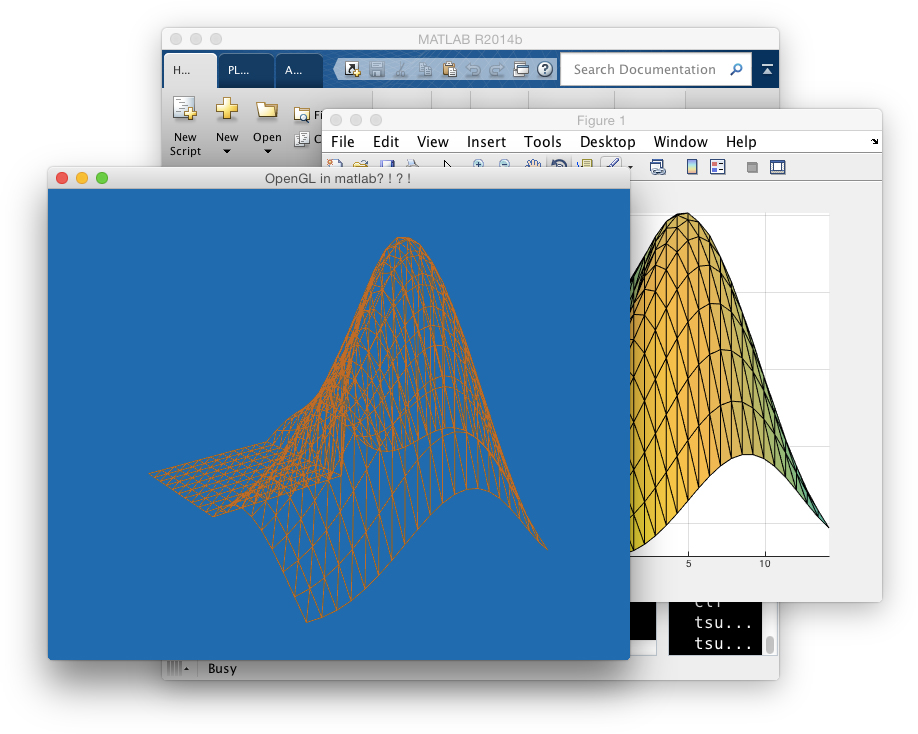 There are still quite a few kinks, but it's at least a start.
There are still quite a few kinks, but it's at least a start.Here's a proof of concept mex function for matlab that passes a triangle mesh and renders it in a new window using glfw and native opengl:
// make sure the modern opengl headers are included before any others
#include <OpenGL/gl3.h>
#define __gl_h_
#include <igl/frustum.h>
#include <igl/read_triangle_mesh.h>
#include <igl/get_seconds.h>
#include <igl/matlab/mexStream.h>
#include <igl/matlab/parse_rhs.h>
#include <igl/matlab/mexErrMsgTxt.h>
#include <Eigen/Core>
#define GLFW_INCLUDE_GLU
#include <GLFW/glfw3.h>
#include <mex.h>
#include <string>
#include <chrono>
#include <thread>
#include <iostream>
std::string vertex_shader = R"(
#version 330 core
uniform mat4 proj;
uniform mat4 model;
in vec3 position;
void main()
{
gl_Position = proj * model * vec4(position,1.);
}
)";
std::string fragment_shader = R"(
#version 330 core
out vec3 color;
void main()
{
color = vec3(0.8,0.4,0.0);
}
)";
// width, height, shader id, vertex array object
int w=800,h=600;
double highdpi=1;
GLuint prog_id=0;
GLuint VAO;
// Mesh data: RowMajor is important to directly use in OpenGL
Eigen::Matrix< float,Eigen::Dynamic,3,Eigen::RowMajor> V;
Eigen::Matrix<GLuint,Eigen::Dynamic,3,Eigen::RowMajor> F;
void mexFunction(int nlhs, mxArray *plhs[],
int nrhs, const mxArray *prhs[])
//#define mexErrMsgTxt(X) std::cerr<<X<<std::endl;exit(EXIT_FAILURE);
//int main()
{
using namespace std;
igl::MexStream mout;
std::streambuf *outbuf = cout.rdbuf(&mout);
// Init glfw and create window + OpenGL context
if(!glfwInit())
{
mexErrMsgTxt("Could not initialize glfw");
}
const auto & error = []
(int error, const char* description){
mexErrMsgTxt(description);
};
glfwSetErrorCallback(error);
glfwWindowHint(GLFW_SAMPLES, 4);
glfwWindowHint(GLFW_CONTEXT_VERSION_MAJOR, 3);
glfwWindowHint(GLFW_CONTEXT_VERSION_MINOR, 2);
glfwWindowHint(GLFW_OPENGL_PROFILE, GLFW_OPENGL_CORE_PROFILE);
glfwWindowHint(GLFW_OPENGL_FORWARD_COMPAT, GL_TRUE);
GLFWwindow* window = glfwCreateWindow(w, h, "OpenGL in matlab? ! ? !", NULL, NULL);
if(!window)
{
glfwTerminate();
mexErrMsgTxt("Could not create glfw window");
}
glfwMakeContextCurrent(window);
int major, minor, rev;
major = glfwGetWindowAttrib(window, GLFW_CONTEXT_VERSION_MAJOR);
minor = glfwGetWindowAttrib(window, GLFW_CONTEXT_VERSION_MINOR);
rev = glfwGetWindowAttrib(window, GLFW_CONTEXT_REVISION);
printf("OpenGL version recieved: %d.%d.%d\n", major, minor, rev);
printf("Supported OpenGL is %s\n", (const char*)glGetString(GL_VERSION));
printf("Supported GLSL is %s\n", (const char*)glGetString(GL_SHADING_LANGUAGE_VERSION));
glfwSetInputMode(window,GLFW_CURSOR,GLFW_CURSOR_NORMAL);
const auto & reshape = [] (GLFWwindow* window, int w, int h)
{
::w=w,::h=h;
};
glfwSetWindowSizeCallback(window,reshape);
{
int width, height;
glfwGetFramebufferSize(window, &width, &height);
int width_window, height_window;
glfwGetWindowSize(window, &width_window, &height_window);
highdpi = width/width_window;
reshape(window,width_window,height_window);
}
// Compile each shader
const auto & compile_shader = [](const GLint type,const char * str) -> GLuint
{
GLuint id = glCreateShader(type);
glShaderSource(id,1,&str,NULL);
glCompileShader(id);
return id;
};
GLuint vid = compile_shader(GL_VERTEX_SHADER,vertex_shader.c_str());
GLuint fid = compile_shader(GL_FRAGMENT_SHADER,fragment_shader.c_str());
// attach shaders and link
prog_id = glCreateProgram();
glAttachShader(prog_id,vid);
glAttachShader(prog_id,fid);
glLinkProgram(prog_id);
GLint status;
glGetProgramiv(prog_id, GL_LINK_STATUS, &status);
glDeleteShader(vid);
glDeleteShader(fid);
// Read input mesh from rhs
const int dim = mxGetN(prhs[1]);
igl::mexErrMsgTxt(dim == 3,
"Mesh vertex list must be #V by 3 list of vertex positions");
igl::mexErrMsgTxt(dim == mxGetN(prhs[0]),
"Mesh \"face\" simplex size must equal dimension");
igl::parse_rhs_double(prhs+1,V);
igl::parse_rhs_index(prhs+0,F);
V.rowwise() -= V.colwise().mean();
V /= (V.colwise().maxCoeff()-V.colwise().minCoeff()).maxCoeff();
V /= 1.2;
// Generate and attach buffers to vertex array
glGenVertexArrays(1, &VAO);
GLuint VBO, EBO;
glGenBuffers(1, &VBO);
glGenBuffers(1, &EBO);
glBindVertexArray(VAO);
glBindBuffer(GL_ARRAY_BUFFER, VBO);
glBufferData(GL_ARRAY_BUFFER, sizeof(float)*V.size(), V.data(), GL_STATIC_DRAW);
glBindBuffer(GL_ELEMENT_ARRAY_BUFFER, EBO);
glBufferData(GL_ELEMENT_ARRAY_BUFFER, sizeof(GLuint)*F.size(), F.data(), GL_STATIC_DRAW);
glVertexAttribPointer(0, 3, GL_FLOAT, GL_FALSE, 3 * sizeof(GLfloat), (GLvoid*)0);
glEnableVertexAttribArray(0);
glBindBuffer(GL_ARRAY_BUFFER, 0);
glBindVertexArray(0);
// Main display routine
while (!glfwWindowShouldClose(window))
{
double tic = igl::get_seconds();
// clear screen and set viewport
glClearColor(0.0,0.4,0.7,0.);
glClear(GL_COLOR_BUFFER_BIT | GL_DEPTH_BUFFER_BIT);
glViewport(0,0,w,h);
// Projection and modelview matrices
Eigen::Matrix4f proj = Eigen::Matrix4f::Identity();
float near = 0.01;
float far = 100;
float top = tan(35./360.*M_PI)*near;
float right = top * (double)::w/(double)::h;
igl::frustum(-right,right,-top,top,near,far,proj);
Eigen::Affine3f model = Eigen::Affine3f::Identity();
model.translate(Eigen::Vector3f(0,0,-1.5));
// spin around
static size_t count = 0;
model.rotate(Eigen::AngleAxisf(0.005*count++,Eigen::Vector3f(0,1,0)));
// select program and attach uniforms
glUseProgram(prog_id);
GLint proj_loc = glGetUniformLocation(prog_id,"proj");
glUniformMatrix4fv(proj_loc,1,GL_FALSE,proj.data());
GLint model_loc = glGetUniformLocation(prog_id,"model");
glUniformMatrix4fv(model_loc,1,GL_FALSE,model.matrix().data());
// Draw mesh as wireframe
glPolygonMode(GL_FRONT_AND_BACK, GL_LINE);
glBindVertexArray(VAO);
glDrawElements(GL_TRIANGLES, F.size(), GL_UNSIGNED_INT, 0);
glBindVertexArray(0);
glfwSwapBuffers(window);
{
glfwPollEvents();
// In microseconds
double duration = 1000000.*(igl::get_seconds()-tic);
const double min_duration = 1000000./60.;
if(duration<min_duration)
{
std::this_thread::sleep_for(std::chrono::microseconds((int)(min_duration-duration)));
}
}
}
glfwDestroyWindow(window);
glfwTerminate();
// Restore the std stream buffer Important!
std::cout.rdbuf(outbuf);
}
Compile with something like:
mex('LDOPTIMFLAGS=','CXX=clang++','LD=clang++','-DMEX -v -largeArrayDims','CXXFLAGS=$CXXFLAGS -std=c++11','-I/usr/local/igl/libigl/include','-I/usr/local/igl/libigl/external/glfw/include','-L/usr/local/igl/libigl/external/glfw/lib -lglfw3_clang','-I/opt/local/include/eigen3/','LDFLAGS=\$LDFLAGS -framework Foundation -framework AppKit -framework Accelerate -framework GLUT -framework OpenGL -framework IOKit -framework Cocoa -framework CoreVideo', 'tsurf_opengl.cpp');
And then if you issue:
[F,V] = surf2patch(surface(16*membrane(1,10)),'triangles');
V = V*axisangle2matrix([1 0 0],pi*0.5)*axisangle2matrix([0 1 0],-0.25*pi)*axisangle2matrix([1 0 0],-pi*0.1);
tsurf_opengl(F,V);
You should see something like:
 There are still quite a few kinks, but it's at least a start.
There are still quite a few kinks, but it's at least a start.